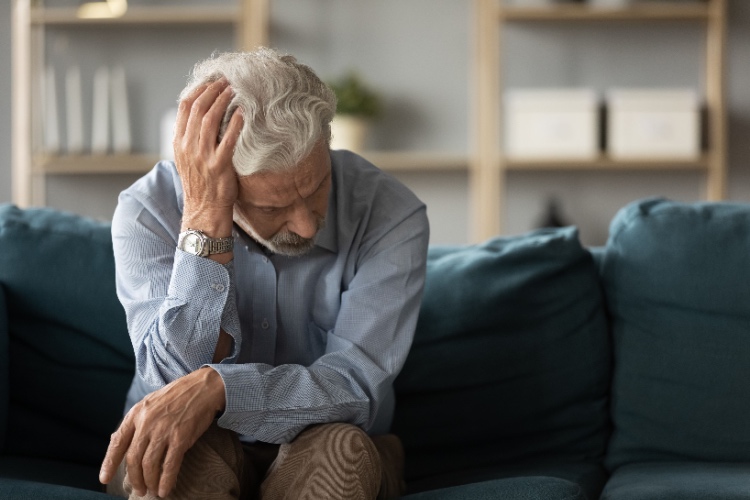
Loss is a universal part of life, but when it comes later in years, it can feel especially heavy. Older adults may lose a spouse, a lifelong friend, their health, or their independence, and the emotions that follow are never simple. Grief and depression often show up with similar signs — sadness, fatigue, withdrawal — making it hard to tell the difference.
The truth is, grief and depression are not the same. Grief is a natural process of healing after loss, while depression is a medical condition that lingers and interferes with daily life. Both can feel overwhelming, but they call for different kinds of care. Recognizing which one is present can open the door to the right kind of support and healing.
Table of Contents
- Why This Distinction Matters for Older Adults
- Understanding Grief
- Understanding Depression
- When Grief Turns Into Depression
- Coping Strategies for Grief
- Treatment Options for Depression in Older Adults
- How Families and Caregivers Can Help
- Why Professional Counseling Can Make a Difference
- Finding Support and Healing With Blue Moon Senior Counseling
- Frequently Asked Questions (FAQ)
Why This Distinction Matters for Older Adults
As people age, life brings more transitions than many expect. Retirement can bring both relief and a sense of lost identity. Health changes may take away independence or favorite activities. Family dynamics shift, with adult children living busy lives or far away. And perhaps the hardest, the loss of loved ones, becomes more common.
These changes naturally lead to grief, and grieving is not only normal but healthy. However, if emotions stay heavy and never ease, it may point to depression. Depression can drain energy, cloud thinking, and take away the ability to enjoy life.
Understanding Grief
Common Causes of Grief in Later Life
Grief isn’t only about death. It can be tied to many experiences that change your sense of self or daily life:
- The loss of a spouse or partner, which reshapes routines and relationships
- Health challenges that make once-simple tasks harder
- Moving from a long-time home filled with memories
- Retirement, which can leave you searching for purpose or identity
These experiences carry weight. Recognizing them as real sources of grief is important in allowing yourself the compassion to heal.
Emotional and Physical Signs of Grief
Grief is not one feeling — it’s many. Sadness, longing, anger, guilt, and even relief may all appear. Physically, grief can bring fatigue, trouble sleeping, changes in appetite and can even weaken your immune system. Some days may feel heavy, while others may bring small moments of comfort or even joy. This ebb and flow is one of the ways grief often differs from depression.
How Grief Changes Over Time
In the beginning, grief may feel overwhelming, like it colors every part of life. Over time, the sharp edges often soften. Memories may shift from painful reminders to sources of comfort. Grief doesn’t vanish, but many people find ways to carry it without being consumed by it. Finding healthy outlets — like journaling, creative expression, or gentle routines — can help guide grief into a space where it feels less overwhelming.
Understanding Depression
What Depression Looks Like in Older Adults
Depression is not just feeling sad. It’s an ongoing state that affects mood, body, and mind. For older adults, it can appear as:
- Feeling empty, hopeless, or numb most of the time
- Losing interest in activities that once mattered
- Sleeping too much or too little
- Trouble focusing or making decisions
- Low energy that doesn’t improve with rest
Unlike grief, depression doesn’t usually allow moments of relief. Instead, it tends to hang on day after day. The National Institute of Mental Health also offers several publications and brochures on what depression could look like.
Causes and Risk Factors
Depression in older adults can develop for many reasons:
- Medical conditions: Chronic illness, pain, or neurological disorders can trigger depression.
- Medication side effects: Some prescriptions can affect mood.
- Loneliness: Living alone, losing social connections, or limited mobility can increase risk.
- Major life changes: Retirement, relocation, or bereavement may play a role.
- Family history: Genetics may also influence vulnerability to depression.
How Depression Affects Daily Life
Depression can affect nearly every part of daily living. Cooking, bathing, or running errands may feel too difficult. Social connections often fade because the energy to maintain them isn’t there. Over time, depression can even worsen physical health by lowering motivation for self-care.
When Grief Turns Into Depression
Sometimes grief can shift into depression. This happens when sadness doesn’t ease, when numbness never fades, or when thoughts of death extend beyond missing someone. While grief softens over time, depression lingers and grows heavier. Studies also show that the loss of a person is a risk factor for the development of depression.
Recognizing this shift matters, because grief benefits from patience and support, while depression improves with treatment. If emotions remain unchanged month after month, or if daily life feels too difficult to manage, depression may be present alongside grief.
Coping Strategies for Grief
Grief has no timeline and no single path, but there are ways to support yourself as you move through it. Talking openly about your loss, whether with friends, family, or a group of peers, helps keep emotions from becoming bottled up. Creating rituals — like lighting a candle, keeping a photo nearby, or planting a tree in memory of someone — can provide comfort and connection.
Gentle activity can also make a difference. A short walk, stretching, or even gardening can ease stress and support both body and mind. Writing down memories or keeping a journal of feelings often brings clarity and comfort as you process emotions.
Counseling can also be a valuable part of coping with grief. Having a safe space to share your story and work through emotions with a professional can help you feel less alone while giving you tools to move forward at your own pace. Most importantly, allow yourself to feel without judgment. Grief takes time, and healing doesn’t mean forgetting.
Treatment Options for Depression in Older Adults
Therapy Approaches
Counseling can be an important step in treating depression. It provides a safe, supportive space to talk openly about how you feel without fear of judgment. A therapist can help you recognize patterns that may be making life harder and teach new ways of coping with negative thoughts. Approaches such as cognitive-behavioral therapy (CBT) are often helpful, as they focus on changing unhelpful thought patterns and building healthier habits. Beyond structured approaches, counseling also gives you a place to feel heard, which can be healing in itself.
Medication and Medical Care
For some older adults, medication is another part of treatment. Antidepressants can help balance mood and ease symptoms, especially when combined with therapy or lifestyle changes. Doctors also review medical history and current prescriptions, since certain health conditions or medications can play a role in how depression develops. Open conversations with your healthcare provider can ensure treatment is safe, tailored, and effective.
Lifestyle and Supportive Practices
Small, steady changes in daily routines can support recovery. Gentle movement, such as walking or stretching, helps lift mood and strengthen the body. Keeping a regular sleep schedule and eating balanced meals provide stability when emotions feel unpredictable. Activities that bring joy — reading, gardening, music, or art — can create moments of relief and meaning. Staying socially connected is especially powerful; even short conversations with a friend or family member can make depression feel less isolating. When combined with professional treatment, these practices help create a stronger foundation for healing.
Finding Support and Healing With Blue Moon Senior Counseling
Grief and depression are deeply personal, and both deserve care. Grief honors love and loss, while depression is a condition that benefits from treatment. Knowing the difference can be the first step toward healing.
If sadness feels too heavy, if energy is gone, or if connection feels out of reach, support is available. Blue Moon Senior Counseling provides tailored senior mental health counseling, helping them face grief, manage depression, and move toward healing in a safe, caring space. You don’t have to go through this alone, support can make the journey lighter. Contact us today for more information.
Frequently Asked Questions (FAQ)
- How can I tell if what I’m feeling is grief or depression?
Grief often changes over time, with emotions that come in waves. Depression feels steady, with symptoms that linger for weeks or months. - Can grief and depression happen at the same time?
Yes. Grief sometimes leads into depression, especially if sadness doesn’t ease or becomes overwhelming. - What can I do if my loved one refuses counseling?
Start with gentle encouragement. Suggest trying one session or offer to go along for support. Sometimes the idea feels less intimidating when it’s framed as a small step. - How long does grief usually last?
Grief doesn’t fully disappear, but it usually softens. If sadness feels just as heavy months or years later, depression may be part of the picture. - How does counseling help with grief or depression?
Counseling offers guidance, tools, and a supportive space. It helps older adults understand what they’re feeling, find coping strategies, and move toward healing in ways that feel meaningful.








